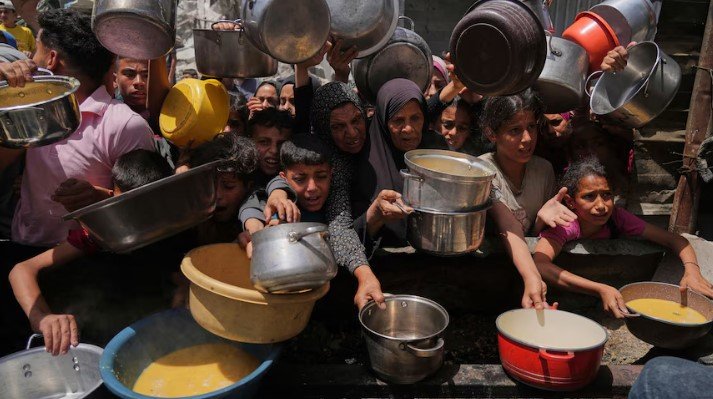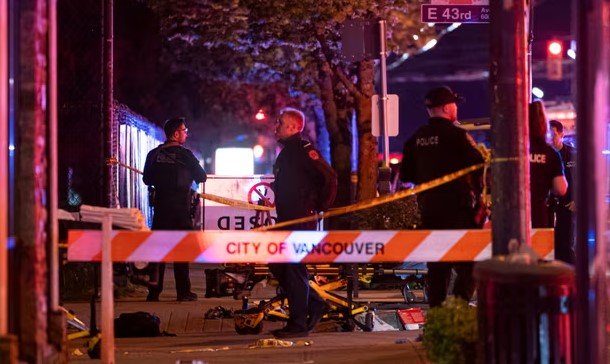Aid Blockades Between Gaza And Israel Have Caused Agitation Globally And Voyager Concern
Revealing that key supplies are being held at border checkpoints behind the Gaza Strip, the United Nations has raised alarm bells about the mounting humanitarian disaster in Gaza. With over two million people, including children, on the brink of starvation, water, and medical aid, urgent access needs to be provided to Israel to aid Gaza. Egypt is providing supplies and all logistical arrangements to help Gaza, but the international community is not allowing aid passage.
In a presser, Martin Griffiths gave about the Blockaded Gaza aid, he repeatedly stated that “not a single truckload of UN-coordinated aid has been successfully delivered to Gaza’s civilian population in the past 10 days, linked to symptoms of voluntary starvation. The claim itself is garbled, as for bodily starvation, Leaving Gaza”.
Concern regarding medical care is through the roof as patients are facing extreme withdrawal symptoms for treated with life-saving medications like anaesthetics. Griffiths stated that the aid delivered has zero hope of arriving at the suffering civilians in hospitals for dialysis.
Wait Times at Border Crossings
The congestion at the Rafah and Kerem Shalom crossings remains the most prominent sign of the deadlock in aid sent to Gaza. Both checkpoints are vital for the flow of humanitarian assistance into Gaza. As reported by Egyptian and UN officials, more than 100 loaded aid trucks are waiting at the border for clearance. Aid shipments are still not permitted despite ongoing discussions between Israel, Egypt, the UN, and humanitarian entities.
Israeli security authorities cited the possibility of weapons being smuggled through the aid convoys as the main reason for the hold-up and remaining inspections. Humanitarian organizations counter that the offer of aid made is far more generous than what is being delivered, given the amount of scrutiny and delay.
Critics have prompted Israel’s Foreign Ministry to make a statement saying, “Israel still makes an effort to ensure humanitarian aid reaches civilians. Israel is cooperating with partners in implementing thorough screening processes…… Aid, however, must not be utilized as a pretense for terroristic activities.”
International Relations Hit Strain
Violence is being condemned globally. French President Emmanuel Macron said, “Humanitarian access to Gaza is a moral and legal imperative. Civilians must not be forced to survive without the necessities of life.” This statement was mirrored by UN Secretary General Antonio Guterres, who referred to the blockade as “unacceptable and unsustainable.”
Blinken did soothe some fears by telling Israel to process the aid shipments faster, while simultaneously claiming that postponing shipment of aid silences regional stability, whilst igniting tensions Middle Eastern-wide. The Biden Administration is now facing backlash from advocacy groups and lawmakers, forcing them to reconsider their stance on military aid provided due to the current crisis.
An immediate ceasefire has also been called for by the European Union, demanding that all warring factions permit unhindered access to aid for those in desperate need.
Humanitarian Catastrophe: The Situation Report
Aid agencies report dire conditions in Gaza. Schools, clinics, and shelters populated by refugees are functioning far above capacity and in many cases, suffering from a complete lack of power. Whole neighborhoods have been flattened, forcing tens of thousands of families into homelessness.
Doctors Without Borders (MSF) made an emergency appeal stating that they were essentially performing surgeries with no anesthetic and had no necessary supplies to sustain them. “We are witnessing a collapse of the healthcare system in real-time,” pronounced MSF field coordinator Dr Lina Nasser.
Water scarcity and lack of hygiene are becoming increasingly concerning. The municipality of Gaza has announced that 90% of the water supply has been either destroyed or cut off. Children and the elderly, especially those with chronic conditions, are the most defenseless.

People’s Voice Out Of The Gaza Strip
Inhabitants trapped in barren landscapes have shared their fight for life. “We have no bread, no water, no medicine. Every night we sleep to the sound of drone blaring and bombs exploding,” shared Samira Al-Masri, a 4 kids mother from briefly occupied Khan Younis. Her husband suffered an injury from a blast and has not been treated due to the absence of medical help.
Another Gaza resident, Mahmoud Suleiman, noted in a WhatsApp voice message, “We hear that aid is at the border, but we see nothing. People are begging for food in the streets. Children are consuming grass.”
Aids Agencies Cry for Safe Corridors
More than 20 international aid organizations, such as the Red Cross, Oxfam, and Save the Children, have come together to request designated humanitarian corridors and safe zones within Gaza. In their collective statement, they say, “Without safe and unimpeded access, any promise of aid is hollow. We urge all parties to respect international humanitarian law.”
The World Food Programme (WFP) also issued a warning that dire famine conditions might arise if aid does not reach within a matter of days. Its Executive Director, Cindy McCain, stated, “We are racing against time. If we don’t act now without conflict, but rather from starvation and disease.”
Political Consequences
The standstill regarding aid is simultaneously affecting diplomatic relations. Countries such as Turkey, Qatar, and South Africa have intensified their criticism of Israel’s part in the blockade. Protests have also erupted in European and Arab cities requesting instant humanitarian relief and an end to the siege.
Israel’s Prime Minister Benjamin Netanyahu remains resolute, declaring “security comes first” while ignoring inflection open to relax aid flow restrictions. Nevertheless, some Israeli commentators and non-governmental organizations (NGOs) have begun to advocate reconsidering the position, claiming enduring international isolation could incur long-term geopolitical consequences.
A Glimmer of Hope?
Regardless of the grim projections, there are signs of progress. United Nations (UN) officials confirmed that discussions are active for a 72-hour humanitarian ceasefire during which the bulk delivery of food, water, and medical supplies can take place. These talks are being facilitated by Qatar and the United States, but no formal agreement has been reached yet.
A senior negotiating humanitarian official shared, off the record, “We’re cautiously optimistic. But until we see the trucks fully loaded with aid and civilians being assisted, cautious optimism is a very fragile thing.”
Table of Contents
World Watches Gaza
The world watches Gaza with growing urgency, but as the humanitarian clock ticks down, the need to act escalates. For now, the people of Gaza continue to suffer in silence while promises remain unfulfilled, shackled not only by bombs and barricades but by the world’s inability to prioritize humanity over politics.
The forthcoming days may bring either relief or even more despair, depending on how border checkpoints and diplomatic chambers decide to act. However, a singular fact remains: one must act now.



